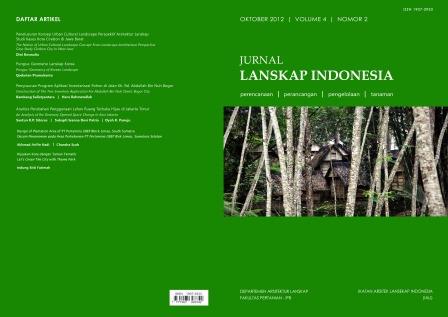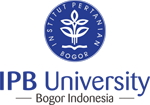DESIGN OF PLANTATION AREA OF PT PERTAMINA UBEP BLOCK LIMAU, SOUTH SUMATERA
Abstract
ABSTRACTPT Pertamina UBEP Block Limau is an exploration state company located in Prabu-mulih city, South Sumatera Province. According to legal regulation, it is stated that PT Pertamina UBEP Limau has responsibility conserving biodiversity in exploration territory. The responsibility of its oil company showed by planting trees in open spaces inside the explorations areas. The trees planted are indigenous trees of Sumatera such as Meranti (Shorea sumatrana), Jelutung (Dyera lowii), Tembesu (Fragraea fragrans), Perupuk (Lopothepalum javanicum), Gaharu (Aquilaria malaccensis) and Pulai (Al-stonia scholaris). Those trees are used to be common plantation trees in South Su-matera but recently their number is become decreased as an impact of monoculture plantation. The only ex-situ trees planted are Jati Solomon (Tectona grandis Linn) as one of requirement from PT Pertamina UBEP Limau. The method for obtaining and processing data is descriptive method by site surveying. The base map was obtained from PT Pertamina UBEP Limau and it was updated with actual hidden under-ground utilities. According to the limitation of open spaces, the planting distance selected was 3x3 m square and the trees were arranged on non-utility open spaces inside exploration territory. According to the final planting plan, there were 10.850 trees planned to be planted on PT Pertamina UBEP Limau. The start of planting plan's implementation was held on August 2012 in Niru Field by planting 1.000 trees. In implementation activity, there are on field planting adjustments as a conse-quence of unrecorded underground utilities.
Keywords: Planting Design, Plantation, South Sumatera
Downloads
This journal permits and encourages authors to post items submitted to the journal on personal websites or institutional repositories both prior to and after publication, while providing bibliographic details that credit, if applicable, its publication in this journal. However, after the article is submitted and published in this journal, it is fully copyrighted by the Jurnal Lanskap Indonesia or JLI. If excerpts from other copyrighted works are included, the author must obtain written permission from the copyright owner and give credit to the source in the article. Then, the writer or reader is allowed to copy, share, and redistribute articles/material in any form. But it must still include the appropriate source and credit because the article in this journal is licensed by Creative Commons Attribution 4.0 International License (CC BY 4.0).
I. Proposed Policy for Journals That Offer Open Access
Authors who publish with this journal agree to the following terms:
- Authors retain copyright and grant the journal right of first publication with the work simultaneously licensed under a Creative Commons Attribution License that allows others to share the work with an acknowledgement of the work's authorship and initial publication in this journal.
- Authors are able to enter into separate, additional contractual arrangements for the non-exclusive distribution of the journal's published version of the work (e.g., post it to an institutional repository or publish it in a book), with an acknowledgement of its initial publication in this journal.
- Authors are permitted and encouraged to post their work online (e.g., in institutional repositories or on their website) prior to and during the submission process, as it can lead to productive exchanges, as well as earlier and greater citation of published work (See The Effect of Open Access).
II. Proposed Policy for Journals That Offer Delayed Open Access
Authors who publish with this journal agree to the following terms:
- Authors retain copyright and grant the journal right of first publication, with the work after publication simultaneously licensed under a Creative Commons Attribution License that allows others to share the work with an acknowledgement of the work's authorship and initial publication in this journal.
- Authors are able to enter into separate, additional contractual arrangements for the non-exclusive distribution of the journal's published version of the work (e.g., post it to an institutional repository or publish it in a book), with an acknowledgement of its initial publication in this journal.
- Authors are permitted and encouraged to post their work online (e.g., in institutional repositories or on their website) prior to and during the submission process, as it can lead to productive exchanges, as well as earlier and greater citation of published work (See The Effect of Open Access).



























